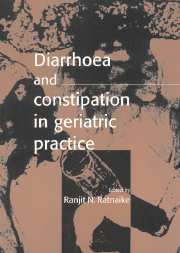Book contents
- Frontmatter
- Contents
- List of contributors
- Preface
- Acknowledgments
- Foreword by Gary R. Andrews
- I Defences of the aging gastrointestinal tract
- 1 Nonimmune defences of the aging gut
- 2 Immune defences of the aging gut
- II Diarrhoea
- III Noninfectious clinical entities
- IV Constipation
- V Perspectives of altered bowel function
- Index
2 - Immune defences of the aging gut
Published online by Cambridge University Press: 17 August 2009
- Frontmatter
- Contents
- List of contributors
- Preface
- Acknowledgments
- Foreword by Gary R. Andrews
- I Defences of the aging gastrointestinal tract
- 1 Nonimmune defences of the aging gut
- 2 Immune defences of the aging gut
- II Diarrhoea
- III Noninfectious clinical entities
- IV Constipation
- V Perspectives of altered bowel function
- Index
Summary
Introduction
With the development of monoclonal antibodies and molecular immunology used to study cell populations, large gains have been made in the understanding of the body's immune defence. Paralleling this is an increased interest in the effect of advancing age on susceptibility to infection, largely due to the rapidly increasing size of the geriatric population. In the USA it is estimated that the elderly occupy 90 per cent of the beds in long-term care facilities and account for nearly 50 per cent of the total health care costs. As they are the fastest growing segment of the population, their importance to the health care system will continue to increase.
The systemic immune system
Aging clearly affects the systemic immune system. Thymic involution is complete by approximately 50 years of age and the level of thymic hormone is undetectable after the age of 60. This may lead to diminished promotion of lymphocyte differentiation and a reduced ability of T cells to elicit a graft versus host response. Additionally, there is a decrease in the response of T cells to nonspecific mitogens and a decrease in the production of cytokines such as interleukin-2. These effects are due to functional alterations that occur with aging as opposed to a depletion in the absolute numbers of cells.
In the humoral arm of the systemic immune system, it is proposed that the major defect with aging is impairment of regulatory function. This is manifested by defective T helper cell activity, enhanced suppressor cell activity, or both.
- Type
- Chapter
- Information
- Diarrhoea and Constipation in Geriatric Practice , pp. 10 - 20Publisher: Cambridge University PressPrint publication year: 1999



